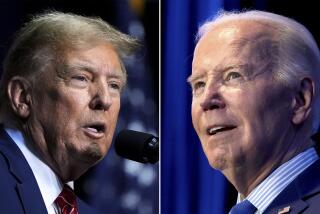Illinois win is a big boost for Mitt Romney
Mitt Romney scored a decisive victory over Rick Santorum in the Illinois primary, tightening his grip on the Republican front-runner’s slot and improving his chances of locking up the nomination by the end of the presidential primary season in June.
Santorum, meantime, suffered a serious setback in his effort to send the GOP battle spilling onto the floor of the nominating convention in late August.
Turnout on Tuesday in metropolitan Chicago, home to most of the state’s voters, was the lightest in years, despite clear skies and record-high temperatures in the mid-80s. But Romney carried Cook County, the second-most-populous in the country, by 30 percentage points. His huge lead there, and in surrounding suburban counties, was too much for Santorum to overcome by winning in less populated parts of the state.
“Tonight, we thank the people of Illinois for their vote and for this extraordinary victory,” a tired but elated Romney told supporters at a hotel in the Chicago suburb of Schaumburg. “Each day, we move closer — not just to victory, but to a better America.”
The 65-year-old candidate, his voice strained by days of campaigning, focused almost exclusively on President Obama, never mentioning his Republican rivals by name. Romney said Obama’s experience teaching law at a nearby university and as a South Side community organizer had failed to teach him about the “unique genius of America’s free enterprise system.”
“For 25 years, I lived and breathed business and the economy and jobs. I had successes and failures. But each step of the way, I learned about what it was that makes our American system so powerful,” said Romney, dressed in a dark blue suit and surrounded by risers filled with cheering supporters. “You can’t learn that teaching constitutional law at the University of Chicago.”
MAP: Illinois GOP primary results
Shortly afterward, from a stage in Gettysburg, Pa., Santorum professed satisfaction with the Illinois results. “We won in the areas that conservatives and Republicans populate. We’re happy about that, and we’re happy about the delegates that we’re going to get, too,” he said.
The former Pennsylvania senator forecast “a big win and a big delegate sweep” in his home state, five weeks from now, adding that he was “feeling very, very good about winning Louisiana on Saturday.”
But Santorum slipped further behind Romney in the all-important delegate count. By one estimate, Romney added 34 more delegates to his already substantial lead over Santorum.
Increasingly, the Republican race has solidified into a divisive contest between the party’s moneyed interests, which overwhelmingly back Romney, and the conservative grass-roots base, which has favored the more meagerly financed and loosely organized Santorum.
One of the biggest challenges facing Romney, if he becomes the presumptive nominee, will be to bridge that divide and begin healing a party that faces a tough fight against an incumbent president in the fall.
But fierce opposition from Santorum, who is unlikely to surrender any time soon, may frustrate that effort. So, too, will the continued candidacies of Rep. Ron Paul and Newt Gingrich, who finished far back in Illinois, as they have in nearly all of the delegate contests. After brief campaign visits last week, Paul and Gingrich abandoned Illinois.
Romney performed better with a number of voter groups in Illinois than he did in nearby Ohio, where he narrowly edged Santorum in a key primary two weeks ago. He carried all ideological groups except voters who called themselves “very conservative.”
The Illinois electorate was somewhat less religiously oriented than in comparable states, another factor that benefited Romney. Only 4 in 10 voters were evangelical Christians, compared with nearly half of the Ohio primary electorate and far more in the Southern states where Santorum has prevailed.
In a striking departure, Romney narrowly led Santorum among voters as the candidate who “best understands the problems of average Americans,” a category in which the wealthy Romney has struggled this year.
The win was Romney’s third in a major Midwestern industrial battleground. Barring an unlikely reversal in later primaries, money has clearly won out this year over grass-roots fervor.
Illinois, Obama’s home state, is unlikely to be in play this fall. But for the first time in many years, it rose to a pivotal role in a Republican presidential campaign.
Repeating a pattern that has played out since January, Romney’s campaign in the state reflected his lopsided advantage in ad dollars and organization. The former Massachusetts governor didn’t take the state for granted, adding a quick stop near Chicago last Friday, followed by events across the state in the 60 hours leading up to the election.
Santorum, by contrast, diverted on Sunday to Louisiana, which doesn’t vote until next weekend, after spending time in Puerto Rico in a fruitless effort to keep Romney from winning all of that state’s delegates in Sunday’s primary.
Compounding Santorum’s vulnerability in a state far less conservative than those he has carried, he was all but invisible in the Chicago media market, which reaches more than half of the state’s electorate and once again was crucial to winning the nation’s fifth most populous state. By one estimate, Romney outspent him by 21 to 1 there.
As a result, Santorum’s presence in the TV ad wars around Chicago was primarily as the butt of a relentless barrage of negative commercials, financed by Romney and a “super PAC” supporting his candidacy. The ads blistered the former senator around the clock as an “economic lightweight” who lacks the executive experience to be president.
Long before the polls closed, Santorum had left the state for Pennsylvania, which he represented in Congress for 16 years. His decision to spend election night there signaled the start of what could well be the conclusive battle of the GOP race: the April 24 Pennsylvania primary.
The campaign calendar offers few opportunities before then for Santorum to apply the brakes to Romney’s momentum with victories of his own. Two exceptions are Louisiana this week and the Wisconsin primary on April 3, which could be a close fight if he has the resources to engage Romney there.
Santorum has been talking up his prospects in Louisiana and Wisconsin in recent campaign speeches. But Pennsylvania looms as an increasingly important test. Losing in his old backyard could effectively end any credible chance for Santorum to oppose Romney’s slow but steady march to the nomination.
A Republican campaign that moved from the winter chill of Iowa and New Hampshire through 33 contests in other states and U.S. territories has now become less a matter of momentum and more a battle over delegates.
In Illinois, Romney extended his delegate lead, not least because Santorum failed to qualify delegates for 10 of the 54 slots at stake in the primary.
Romney has more than twice as many delegates as Santorum, his nearest pursuer, according to the latest Associate Press projection. But he still is less than halfway to the 1,144 needed to clinch the nomination, having lost 10 contests to Santorum and two to Gingrich.
With 22 states and the District of Columbia yet to vote, Romney still needs to win well over half the remaining delegates to be assured of the nomination.
Many of those delegates won’t be selected until June, when six states, including California, with the largest delegation of all, hold primaries. That makes it unlikely that Romney could become the presumptive nominee before then, though if he keeps racking up big primary victories, the contest could effectively conclude sooner.
Times staff writers Alana Semuels in Schaumburg, Ill., and John Hoeffel in New Orleans contributed to this report.
More to Read
Start your day right
Sign up for Essential California for news, features and recommendations from the L.A. Times and beyond in your inbox six days a week.
You may occasionally receive promotional content from the Los Angeles Times.






